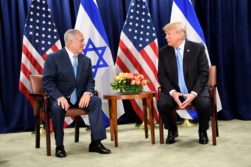
PM Netanyahu and US President Trump both have concerns about Turkey. Illustrative. Photo courtesy of Avi Ohayon (GPO)
As Turkey invades neighboring Syria to battle alleged terrorists among the Kurdish minority there, Israel has warned of the potential for “ethnic cleansing” and the United States on Monday issued sanctions against the Turks. Israeli Prime Minister Benjamin Netanyahu also offered humanitarian support to the Kurdish people. “Israel strongly condemns the Turkish invasion of the Kurdish areas in Syria and warns against the ethnic cleansing of the Kurds by Turkey and its proxies,” said Netanyahu in a statement released by his office last Thursday. “Israel is prepared to extend humanitarian assistance to the gallant Kurdish people.”
On Monday, the US opposition to the Turkish military moves took the form of sanctions imposed upon the US ally. US Secretary of State Mike Pompeo said on Monday that the Turkish Ministry of Defense, Ministry of Energy and three senior Turkish officials had been sanctioned. Speaking in a statement released by the State Department, Pompeo said the intent of the sanctions is to “press Turkey to halt its military offensive against northeast Syria and adopt an immediate ceasefire.”
Separately, US President Donald Trump issued a statement posted to Twitter in which he also announced an increase on tariffs on steel trade with Turkey and halted talks on a $100 billion trade deal with the Turks. “I am fully prepared to swiftly destroy Turkey’s economy if Turkish leaders continue down this dangerous and destructive path,” said Trump in his statement.
Trump highlighted humanitarian concerns in Turkey’s invasion and said they were “setting conditions for possible war crimes.”
The US steps come as The Guardian reported that Trump called upon Turkish President Tayyip Erdo?an to halt the offensive in a phone order valium australia call on Monday.
Turkey alleges ties between terrorists that have attacked Turkey and the Kurdish Syrian Democratic Forces (SDF), a group that had been battling the Syrian regime and ISIS in that country’s civil war. However, in a twist, The Guardian reported that the SDF has reached an agreement with the Syrian regime of Bashar Assad to fight back Turkey, setting the region up for a potential conflict between the two countries.
Pompeo hit on all those concerns in his statement on Monday. “As the President has made clear, Turkey’s actions in northeast Syria severely undermine the D-ISIS campaign, endanger civilians, and threaten the security of the entire region,” he was quoted as saying. “If Turkey’s operation continues, it will exacerbate a growing and daunting humanitarian crisis, with potentially disastrous consequences.”
In a call last Thursday republished by the State Department, a senior State Department official explained that the SDF includes a group that is the “Syrian offshoot” of a Kurdish militant group that has launched terror attacks in Turkey for decades. The official noted that the US and Turkey had an understanding for a semi-ceasefire zone inside Syria, but that the Turks decided it was insufficient. The official noted that Turkey has had a ceasefire with the Kurdish terror group before.
Turkish leader Erdo?an has repeatedly criticized Israel for alleged activities against the Palestinians and Turkey has had a problematic relationship with Hamas terrorists in the past. Netanyahu, in return, has strongly criticized the Turkish President, including last month.
In a statement released by his office on September 24, Netanyahu said, “He who does not stop lying about Israel, who slaughters the Kurds in his country, and who denies the awful massacre of the Armenian people—should not preach to Israel.”
(By Joshua Spurlock, www.themideastupdate.com, October 14, 2019)
